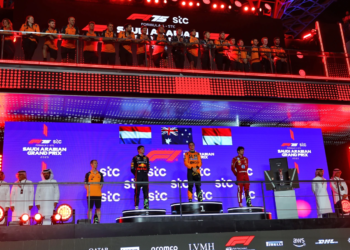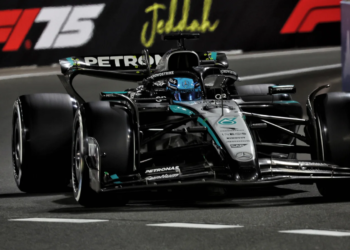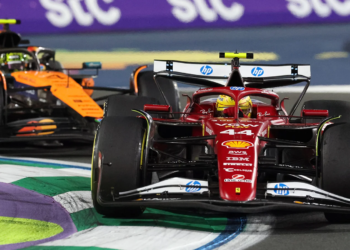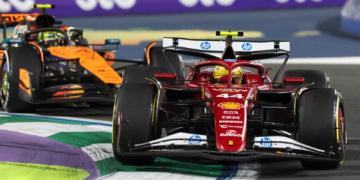The F1 circus was in Abu Dhabi for the 2023 season finale this past weekend, having arrived from the other side of the world in Las Vegas to complete a doubleheader to round out the year. With that comes fatigue and jet lag, bringing the curtain down on a record 22-round season, reduced from 24 due to the cancellation of the scheduled events in both China and Imola.
Next year, however, the calendar stands at a record 24 races again, with Vegas, Qatar and Abu Dhabi forming a triple-header to conclude the season, shortly after an extensive period of races in the Americas.
The jetlag, fatigue-induced nature of the paddock upon arrival at Yas Marina, coupled with next year’s inflated schedule, is providing a major problem for the premier single-seater series.
In the past two decades, Formula 1 has gone from regularly featuring 18 Grands Prix per year, to 20, now 22 and next year 24.
Cast your mind back to 2003 and the season was only 16 races long and ended at the beginning of October.
Now, the ever-increasing calendar sees the paddock on the road for well over half a year, with little respite and the cracks are starting to emerge.
Compounding the issue this year is the ridiculous nature of ending the season on a back-to-back, with one Grand Prix in Vegas and the latter across the other side of the world in Abu Dhabi.
This, plus concerns for future iterations of the F1 calendar, was not lost on World Champion Max Verstappen.
“I definitely think for the future – of course for next year it’s not possible – but it’s a little bit odd that we are on the other side of the world basically before getting here,” he questioned.
“Especially when you’re talking about sustainability.
“It’s probably not very sustainable, not only for the emissions but also for the human body.
“Eventually we always deal with it, but I don’t think it’s great.”

As F1’s popularity soars and multiple regions wish to cash in on the sport, little thought has been made of the ill effects on the people working within the series when more and more races are being bolted onto the calendar.
How many Grands Prix is too many?
The general mood in Abu Dhabi would suggest that it’s 22, making next year’s 24-race calendar a frightening prospect if it materialises.
However, it’s not just fatigue that should be cause for concern.
There’s also the case of having too much of a good thing, saturating the market, quantity over quality.
Out of 22 races this year, 19 were won by Verstappen and just one race was won by a non-Red Bull driver – Carlos Sainz in Singapore when the all-conquering RB19 was unsettled around the Marina Bay bumps.
If the Milton Keynes outfit’s dominance is set to continue, fans will be subject to an endless bout of Red Bull wins again.
“I think we just have to make sure that we keep delivering and we just don’t make a lot of races for the sake of doing them,” Verstappen’s Red Bull team-mate, Sergio Perez, added.
“I think quality level is still very important to have in the sport to make sure we keep this upward route.”

In the days of 18, heck, 16 Grands Prix per season, the relative sparsity of the calendar served to make each race special.
That is largely gone in the modern era.
It feels as if as soon as one race is over attention immediately turns to the next one, with no room to properly enjoy the event in the present moment.
Perez, like Verstappen, is also fearful of fatigue developing.
“I don’t remember seeing people so exhausted on the last race,” he said.
“And so I think it’s something that we got to be taking it very seriously.
“It’s important for the sport, for the drivers to obviously keep having these long careers that we’ve seen.
“From the staff, from the mechanics, we want them to have very long careers as well. So it’s something we’ve got to consider.”

Talking of long careers, F1’s oldest driver at the age of 42, Fernando Alonso has been rightly praised for his ongoing commitment to the sport, having opted to return from retirement to commence a second spell.
Despite making his debut in 2001, Alonso appears to have the same hunger and skill as he’s always done 22 years later.
Many think his career will be never-ending, but the ever-increasing schedule threatens to break the Spaniard’s unwavering commitment to F1.
“I said many times, even before in 2018, the day that I will stop racing is not because I feel not motivated for driving or I feel slow,” Alonso outlined ahead of the Abu Dhabi weekend, in which he secured fourth in the championship.
“I don’t think that time will arrive, in terms of feeling slow, because I have extreme self confidence in my performance.
“But it could be with the calendar and the demanding schedule, one day I will feel it is time, because there are other things in life.
“It has been a very demanding season with 22 races and two cancellations.
“Next year with 24, a proper calendar, we have to see how it feels.
“Even Las Vegas, I saw today it is triple header.
“I don’t know why, I thought that Vegas was alone next year, and then Qatar and Abu Dhabi together.
“I just find out 10 minutes ago that its three races together.
“This type of thing will drain my battery, not driving.”
If Formula 1 risks losing talents such as Fernando Alonso for the sake of a bloated calendar, then perhaps it should take a few steps back and restrategise, before the entire sport hampers itself.










hen Brabham won in 1966 there were only 9 races in the championship.